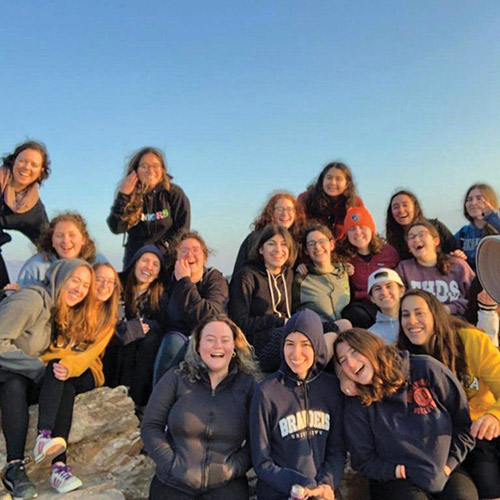

Friday nights here in Modi’in are a quiet affair.
The seven girls living in our house flood out onto our balcony overlooking the street, as the sound of song and prayer wafts up. The Chief Rabbi of Israel, Rabbi David Lau, gives a dvar Torah from his backyard at the end of our little dead-end street. We crowd around our little dining room table and have a Friday night meal, laughing over the weird antics we’ve gotten up to during our week of quarantine, and end our nights with talking and reading.
I didn’t think it would be like this when I started my year in seminary, yet now I’m living in a house with five friends and a madricha, quietly waiting out a pandemic and taking online classes. I haven’t been to my beit midrash in weeks, and when I last visited to take a gemara, the empty silence and absent seats were disquieting. Most of the girls who had filled this space for six months were in their homes in America.
Most Israeli gap year programs have completely emptied out; ours, Amudim, fared relatively well, with one-fourth of our student body remaining in Israel. Amudim had 24 full-time students in September, and the six students who chose to remain at the program despite COVID-19 are attempting to adapt to our new “normal.”
“It’s hard to reconcile my experience of only a few weeks ago with my current situation,” admitted Summer Pitocchelli, from Atlanta, Georgia, who chose to remain in Modi’in and continue learning at Amudim. “However, I’ve found that [quarantine] has been an opportunity to grow and connect in a different way with people with whom I hadn’t connected previously.”
The odd situation of quarantine is paired with the rapid development of technology in this new age. Teachers and students alike are finding themselves shifting their entire lives online as they continue to host and attend classes despite the pandemic.
“The optimism and ability of our teachers to rapidly adjust entire curriculums to accommodate an online platform spanning five time zones is beyond inspiring,” continued Summer. “We owe them so much for continuing this semester, despite the challenges.”
Summer, however, represents a very small minority of students who remained in the country in spite of the pandemic that drove most of her friends to flee the country in droves. Many of these students are, like Summer, attending lessons over Zoom as a substitute for learning in the beit midrash.
Calev Koppel, who attended Yeshivat Migdal HaTorah in Modi’in, returned home to Bergenfield, NJ last month, even though the majority of the students in his program continue to learn at their yeshiva in Israel. He explains, “I think that everyone has different settings that work for them, and for me, returning to America was the best option…Given all the circumstances and either having cabin fever at home or in yeshiva, it was worth it for me to [come] home. Zoom classes are not bad…I do miss being in the beis, being with everyone and attending shiur in person, but given the circumstances I think I have a great schedule working for me.”
It’s important to note that some students, like Calev, are faring well despite the pandemic and are still taking advantage of opportunities to learn and socialize through the use of social media. Calev’s certainty in his decision, however, is not mirrored by all former yeshiva and seminary students.
Tabitha Klein, an Amudim student from Highland Park, New Jersey, has a very different take on the situation. “The second I turned the doorknob and walked into my living room I burst into tears,” she said. “I felt like I had made a terrible mistake…The America I wanted so desperately to come back to is not the one I got, and I can’t go back to Israel either.”
For many students, the stress of the already-overwhelming situation has been exacerbated by the trauma of losing their carefully curated gap year environment: friends, classes and a sense of home away from home.
“As my friends started buying last-minute plane tickets, I started thinking about what this place would be like without many of the people who made it so special to me,” continued Tabitha. “The past few days have been flooded with tears by almost everyone I saw, people who were leaving, people who would miss everyone so much.”
Although the situation is undeniably difficult, people are using technology to reach out to one another in place of in-person contact. In the past month, I have attended Zoom birthday parties, participated in online shiurim with my friends and called more friends than I have all year. My friends have all had similar experiences of attempting to navigate novel social situations after being forced to utilize video streaming platforms to hang out with friends.
“While my friends are still at a range of distances from me, I value the ability to talk to them more than I wish I could go to Barnes and Noble right now,” quipped Tabitha. “So despite my location, or my inability to reflect on whether I’ve made the right choice, I did gain something from everything that has happened.”
Despite the chaos and disappointment caused by gap year programs across Israel shutting down, students are continuing to find the silver lining in the situation. As Israel begins to ease its lockdown restrictions and permit larger gatherings, students and administrators alike have begun to hope that next year’s students will be able to learn in Israel after all.
Brooke Schwartz is a former Jewish Link intern and is currently studying at the seminary Amudim in Modi’in, Israel.













